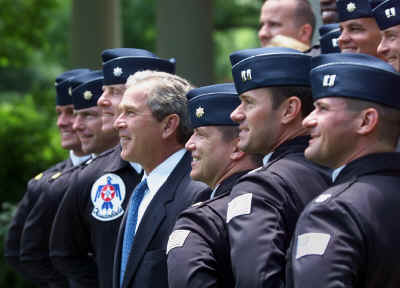The officer promotion process is one of the weakest elements in the US military. Performance rating systems have become inflated to the point they are useless except for serious punishment. As a result, many officers lacking intellect manage to accumulate an excellent record for promotion. They use flattery while avoiding problems and rely on subordinates to get their job done. Their superiors mark them outstanding as is customary, although those who work with them know they are incompetent. They may be polite and hardworking, but have difficulty understanding new concepts or even basic math. Nevertheless, so long as they stay out of legal trouble, don't rock the boat, and demonstrate total loyalty to their boss, they are often promoted into the career force. All career military men can recall a few Colonels and even Generals who were of below average intelligence, yet through good looks and charm, family connections, or winning a high award for heroism, they moved to the top.
One solution is to require all officers to take the Graduate Management Admissions Test (GMAT) within two years before consideration by a promotion board for O-3, O-4, O-5, and O-6. Officers who fail to take the test would be passed over for promotion. The GMAT is a key part of the selection process for all graduate business schools. It is much better than the simple vocabulary/math test used for SAT and ACT college entrance examinations. The GMAT involves reading comprehension, deductive reasoning, and problem solving. Universities use testing because of the difficulty in comparing grades and accomplishments from hundreds of undergraduate schools with varied standards and different levels of peer competition. Likewise, the GMAT can help military promotion boards at no cost to our military. Officers can take the GMAT at any of the hundreds of test sites around the globe and simply enter a code on their test form so their official score is sent directly their to their service record branch.
 Intelligent officers are often frustrated by military service since
everyone is generally promoted at the same pace, based solely upon pleasing
their raters and working the bureaucracy to secure the best career path. They
may irritate superiors by trying to fix problems others don't recognize. The brightest lieutenants soon realize they
will advance at the same rate as below average officers. There is no easy solution to this problem,
but if GMAT scores were part of the promotion process, they would be encouraged to
stay in the military knowing they have an edge.
Intelligent officers are often frustrated by military service since
everyone is generally promoted at the same pace, based solely upon pleasing
their raters and working the bureaucracy to secure the best career path. They
may irritate superiors by trying to fix problems others don't recognize. The brightest lieutenants soon realize they
will advance at the same rate as below average officers. There is no easy solution to this problem,
but if GMAT scores were part of the promotion process, they would be encouraged to
stay in the military knowing they have an edge.
If GMAT tests are required, officers will devote thousands of hours to improve their GMAT score. They will work on math puzzles, read more books, and study vocabulary. These years of self-study for the GMAT will improve the mental agility of all officers. This is far better than the current incentive to please their raters by improving their golf or tennis game, or hosting dinner parties. A GMAT score will also help select the best candidates for military funded graduate-level schools.
Former President George Bush was admitted to Yale only because of family connections; his grandfather lived next door to the Dean. This family tradition ended when Yale began to require SAT scores as part of the admission process, so George's younger brother Jeb went to the University of Texas. Standardized testing is not the solution for selecting officers for promotion, but requiring the GMAT will inject an element of fairness and provide a valuable tool to improve the quality of the officer corps.
Carlton Meyer editorG2mil@Gmail.com
©2008 www.G2mil.com
Jan 11, 2016 - 10 Percent of U.S. Army Majors are Illiterate!
One problem in our military and government is that poorly educated people are promoted to important positions. Some advance because of good looks and a pleasing personality, while others benefit from nepotism, political connections, or racial advancement quotas. I saw many during my time in military and government service. These people never send out e-mails knowing they can't write proper sentences and misspell common words. The spell checker helps, but they confuse their/there, whose/who's, role/roll ect. We all make such mistakes, but patterns become evident, like spelling truck as "truk" several times in one message. In meetings it becomes apparent that they cannot grasp certain things. I found this recent article of interest, which includes:
"Unlike the other armed services, who only send 25 percent or fewer members of each year group to resident staff college, the Army sends almost 50 percent of each year group. This results in functionally illiterate Army majors coming to [Command and General Staff College] CGSC.
Think Iím exaggerating? Then you need to see the test scores from the Nelson-Denny Reading Exam. The Nelson-Denny, which has been around since 1929, measures the reading and comprehension ability of students. Approximately five percent of incoming U.S. Army students at CGSC each year score so low on the Nelson-Denny that they could fairly be classified as functionally illiterate."
Keep in mind that our Army sends its best majors to CGSC as a prerequisite of promotion. So the overall number of illiterate Majors is probably around 10%.